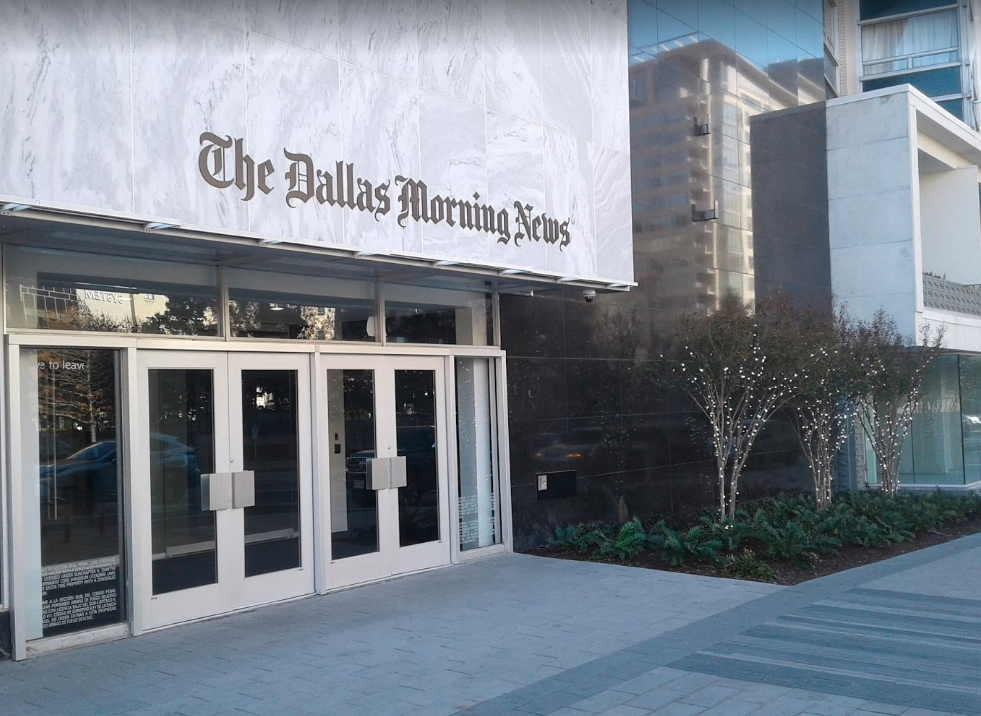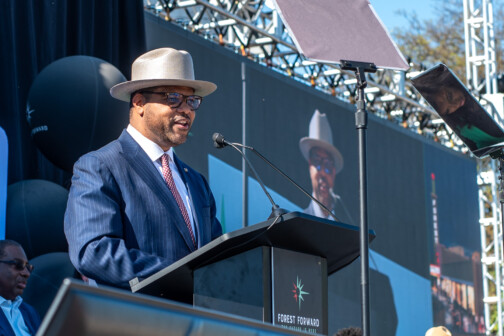Let’s get all the cards on the table first. The Coalition for a New Dallas (CND) is the name of both a super PAC and a 501(c)(3) nonprofit co-founded by Wick Allison, the guy who started D Magazine and who was, until recently, my boss. His wife, Christine Allison, now has that enviable job (Wick is too busy fishing in Upstate New York). The CND operates independently of the magazine, though the two organizations do share some beliefs about the harm done over decades of designing American cities for cars rather than humans. Seven years ago, we were the first publication to suggest that tearing down I-345 and replacing it with a boulevard would restitch downtown Dallas with Deep Ellum and create billions in economic development. That story was written by Patrick Kennedy, an urban planner who went on to co-found the CND and become a DART board member.
That’s the deal on our end. Now let’s look at an editorial the Dallas Morning News published this morning. The headline: “Southern Dallas Residents Need I-345. Why Is a Wealthy Consortium Trying to Tear It Down?” You need to read the entire thing to appreciate its dunderheadedness, so here it is:
The long-running question over what to do with a tiny strip of highway in Dallas is now tied up in a weird political knot.
Roddrick West, son of powerful state Sen. Royce West (a.k.a. Democratic U.S. Senate candidate Royce West), wants to do business with the Texas Department of Transportation.
Specifically, he wants to lease land under Interstate 345, a mile-and-change stretch dividing Deep Ellum and downtown. And he wants to build soccer fields beneath the highway.
Others can debate the merit of the proposal. But given his father’s role as vice chair of the Senate’s transportation committee, this is raising eyebrows, as anyone would expect. There’s no evidence we’ve seen that Roddrick West has done anything wrong. But deals like this need not only avoid conflicts of interest; they need to avoid the appearance of conflicts of interest.
So the Dallas City Council, which shares the land with TxDOT, was right to hit pause on this proposed lease Wednesday until everything that happened around it is aired in the full light of day.
As interesting as it might be, the Roddrick West saga is really an odd subplot in a story of more lasting importance about I-345 itself.
A powerful consortium calling itself the Coalition for a New Dallas led the opposition to the West deal. Members of the coalition appear eager to use the proposed lease to draw attention to their more important goal — tearing down I-345.
The group — founded by D Magazine Partners CEO Wick Allison and including developers with transparent moneyed interests along with a smattering of current and ex-politicians — wants to replace I-345 with surface streets in the expectation that a dense and lively urban neighborhood will spring up in its place.
That sounds wonderful in a way. We think highways have done too much to divide Dallas too, and we hope to see that mitigated, beginning with the canyoning and decking of I-30 between South Dallas and East Dallas.
But the political push to tear down I-345 — issuing almost entirely from the Coalition for a New Dallas — is the sort of urbanism that gives urbanism a bad name.
The highway links I-45 to the south with Central Expressway to the north. Some 180,000 cars travel it per day. More than 75,000 of those begin their trips south of I-30, heading north. Many of the people in those cars are middle- and lower-income residents from southern Dallas getting to their jobs in the north. They rely on the road as a way of life.
A dense urban neighborhood of pedestrian-friendly streets sounds picturesque. But it doesn’t sound like the sort of place a commuter will be able to easily traverse on the way to a custodial job at Parkland Memorial Hospital or a maintenance job at Love Field.
And it sure doesn’t sound like the kind of neighborhood with price points to invite working people to set up a home.
A new Dallas does need to be a place where highways don’t split neighborhoods. But getting to that Dallas doesn’t mean tearing down a stretch of road that serves working people who need to get to work and get home more than they need a lively pedestrian corridor.
It means considering the needs of all the people and acting not in narrow interests of a few but in the broader interests of the greater good.
I am going to address first the flawed internal logic of the editorial (which makes the paper look merely careless), and then I’m going to share some context (which makes the paper look clueless).
The editorial writer says: the Roddrick West deal looks like it could be shady. Council was right to slow it down and scrutinize it. The CND was the group that brought this shady-looking deal to the public’s attention. But they are giving urbanism a bad name because even though highways have divided Dallas and caused harm, this particular highway is not one of those harmful highways, and if it were replaced with a cool neighborhood where people wanted to live, working-class people couldn’t afford to live there. So the highway shouldn’t be torn down.
Bear in mind that the person who wrote this editorial earns about $100,000 per year (a guess based on my knowledge of the industry). Used to be, if someone asked who wrote a particular editorial, the paper would tell you. You could go, “I can’t believe Person Smith makes $100,000 a year to write such drivel!” Not anymore. The paper’s editor, Mike Wilson, told me, “We don’t talk about individual authors because the editorials represent the view of the paper.”
OK, let’s talk about the view of the paper. Five years ago, the DMN considered the CND a “grass-roots effort.” Now the paper calls it a “powerful consortium.” I actually don’t want to refute that descriptor. I just want to say that everyone involved with the CND needs to dress better. If you lead a “powerful consortium,” your shoes shouldn’t look like Patrick Kennedy’s. Miguel Solis, Wick Allison, Matt Tranchin — everyone involved with the CND needs to stop shopping at Kohl’s and step up their game. Lynn McBee is the obvious exception.
But Tim! You’re making jokes about the way people dress when we’re talking about important social issues like working-class people having access to jobs!
There are two studies underway that will give us a clearer picture of what Dallas might look like without I-345. If we tear down the highway, how will that affect commutes? How will that impact the city’s growth and its poorest communities? Those two studies — one by TxDOT, the other by a national firm working for the city — are due in June. I don’t understand how someone could write this DMN editorial and not mention that.
Also, how could the editorial writer not mention the TxDOT analysis of I-345 that has already been done? It’s in a document called CityMAP, for “master assessment process.” Read more about it here. According to TxDOT, if we do nothing with I-345, if we just let it stand, in 20 years we will force drivers every year to endure 272,500 additional hours of traffic congestion. If we tear down the highway, that number shrinks to about 163,000. Have a look.
That’s what TxDOT says, not a consortium of poorly dressed, yet powerful, people. I mean, maybe TxDOT engineers shop at Kohl’s, too. I don’t know.
Anyway, the point is: I-345 destroyed a poor, black neighborhood when it was erected. Claiming that it now helps poor, black folks in southern Dallas is ignorant. People of all colors in Dallas deserve better — from their roads and their newspaper.
(P.S.: the DMN’s architecture critic agrees with me.)






